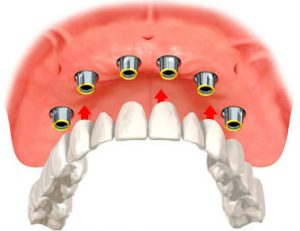 If you’ve ever worn dentures, you may already know about their drawbacks and the problems associated with them. But many people don’t know that dentures are not the ideal when it comes to replacing missing teeth. We’ll take a look at these problems and at how implant overdentures—also called implant-supported dentures—can offer a better experience.
If you’ve ever worn dentures, you may already know about their drawbacks and the problems associated with them. But many people don’t know that dentures are not the ideal when it comes to replacing missing teeth. We’ll take a look at these problems and at how implant overdentures—also called implant-supported dentures—can offer a better experience.
Why People Choose Implant Overdentures
Remember that traditional removable dentures rest on top of the gums. Gums are soft tissue and they move some, so you will lose that solid feeling that comes with having teeth anchored in the bone.
Lower dentures have most of the problems. They’re held in place by gravity, with the help of the tongue and cheeks, so you have to train your muscles to keep them steady. They can have a tendency to tip when you chew, and they can slip and even fall out at embarrassing moments, much more so than the uppers.
Upper dentures move also, but not nearly as much. But another problem they have is that they cover the palate. There are taste buds in your palate, so this will reduce the enjoyment you get out of food. They can also interfere with speech.
Then a long-term problem is that the absence of any tooth roots in your jawbone leads to a condition called facial collapse, in which the mouth looks shrunken or fallen in. Here’s how: Natural teeth roots send a signal to your jawbone that helps preserve it. Dental implants send the same piezoelectric signal. If there are no roots or implants present in the bone, your body senses that the bone is no longer needed to support anything and begins to resorb the minerals in the bone for use elsewhere in the body. This resorption continues for years until, after 10 or 20 years, you could be left with a condition called facial collapse. This is a serious condition because the loss of bone in the jaw will eventually make it very difficult to support dentures. Once this happens, many people are relegated to eating only soft foods, and the health consequences can be serious.
Why Implant Overdentures Work Better

The ideal treatment would be to replace each tooth with a dental implant or replace every two or three, putting bridges between them. But this is expensive, and not everyone can afford this Cadillac of treatments. So most people who choose implant overdentures will choose to support their dentures with four, six, or eight implants. This will solve all of the problems listed above because even two implants can prevent facial collapse.
If you’d like to learn more about how implant overdentures can help you, you can read our dental implants page. If you’re ready to move forward, you may call our office to schedule a consultation or click here to request an appointment online.